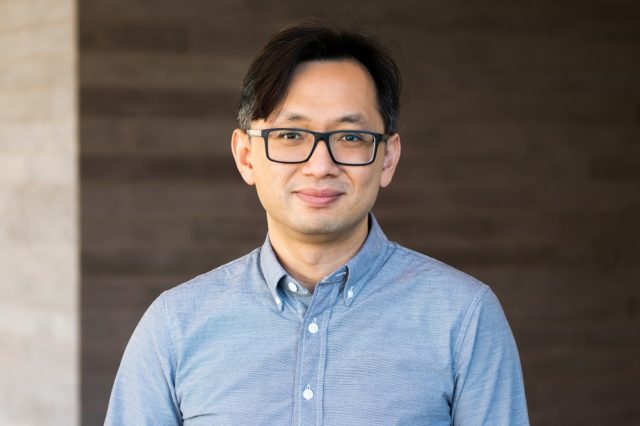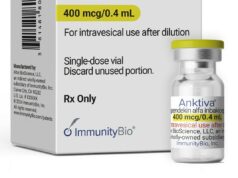
The oldest immunotherapy uses a signaling protein found in the body that can marshal immune cells into action. Engineered versions of this protein, interleukin-2 (IL-2) have been available for decades as a treatment.
Andy Yeung, co-founder and chief technology officer of Asher Bio, notes that IL-2 was the first immunotherapy that provided a durable response in cancer. However, in sparking its immune activity, IL-2 also affects other cells, some of which can counteract the desired immune response, he said. Even worse, that broad effect can trigger dangerous toxicity. Despite those problems, the potential of IL-2 to treat more types of cancer has led several companies to pursue ways to improve the immunotherapy.
Asher Bio is joining them. The South San Francisco-based startup is developing an IL-2 drug that could be more targeted and less toxic than other approaches. It is coming out of stealth with $55 million and a plan to bring its lead program into human testing next year.
Third Rock Ventures led Asher’s Series A round of financing. Other investors included Boxer Capital of Tavistock Group, Invus, Y Combinator, and MBC Biolabs.
Asher’s approach starts by identifying a protein capable of sparking the desired therapeutic benefit. That protein is engineered so that it doesn’t bind to any immune cells. Next, this immunomodulating protein is attached to another protein that binds only to a target on the desired immune cell.
Yeung said Asher’s IL-2 fusion protein takes a page from nature. Similar to the way the two arms of an antibody work together to have a potent but targeted effect, so too does Asher’s drug. It works by cis-targeting, meaning it binds to two receptors on the same cell. That approach makes the drug specific only to its target; in the case of lead Asher drug AB248, that target is CD8+ T cells.
“We’re only activating the cells that matter,” Yeung said. “We think our approach is fundamentally different than others and we think this sets a new bar for IL-2 therapies.”
Research in the IL-2 space has led to a lot of recent dealmaking. Last year, Sanofi acquired Synthorx and its IL-2 drug candidate in a $2.5 billion deal. The Synthorx drug, currently in Phase 1 testing, is designed to increase the numbers of CD8+ T cells and natural kill cells without causing vascular leak syndrome, in which fluid leaks from blood vessels into surrounding tissue. The potentially life-threatening side effect is a known risk of aldesleukin, an IL-2 therapy marketed by Clinigen.
Meanwhile, Waltham, Massachusetts-based Xilio Therapeutics is developing drugs that selectively activate at the tumor while sparing healthy tissue. The company’s lead cytokine program is a version of IL-2 engineered with a “blocking domain” masking the protein’s binding capability. That mask stays in place until the engineered cytokine reaches the tumor microenvironment. Enzymes there cut away the blocking domain, setting the drug free to start its work. Last month, Xilio raised $95 million in Series C financing, part of which will be used to advance its IL-2 drug to the clinic.
Craig Gibbs, a former executive at cancer immunotherapy developer Forty Seven who joined Asher last year as CEO, said the biotech with the approach closest to that of his company is Pandion Therapeutics. The Watertown, Massachusetts-based company pairs IL-2 with a mutated protein, a combination intended to selectively expand regulatory T cells without also activating immune cells that spark inflammation. Last month, Merck agreed to pay $1.85 billion to acquire Pandion, a deal that followed encouraging preliminary Phase 1 data for the biotech’s lead drug candidate in ulcerative colitis.
Yeung co-founded Asher with Ivana Djuretic, the startup’s chief scientific officer and a fellow colleague at Pfizer. When the pharmaceutical giant decided to relocate some employees, Yeung and Djuretic chose not to leave the Bay Area. They started Asher in 2019 and spent the next two years optimizing their molecule. Yeung said Asher’s work started post-Pfizer and the startup owns all of its intellectual property.
Asher raised some early funding from Y Combinator. Last year, the company crossed paths with Third Rock. The venture capital firm saw opportunity in the Asher research. In lab tests, Asher’s AB248 showed 1,000 times more specificity for CD8+ T cells over regulatory T cells, Gibbs said. In mouse tests, the company compared its lead drug candidate against a type of immunotherapy called a PD-1 inhibitor as well as a second-generation IL-2 drug. Gibbs said the Asher drug showed “superior tumor clearance” without weight loss in the mice, which would be indicative of side effects.
Gibbs said the Series A funding will enable Asher to reach Phase 1 testing in solid tumors next year. The cash will also support the company’s efforts to develop IL-2 drugs for other immune cell targets. Beyond cancer, Gibbs said Asher’s technology could address autoimmune disorders and infectious diseases.
As for the startup’s name, Asher comes from Hebrew and means “blessed” or “fortunate.” The name is meant to convey the company’s aim “to restore health and happiness to patients,” Yeung said.








